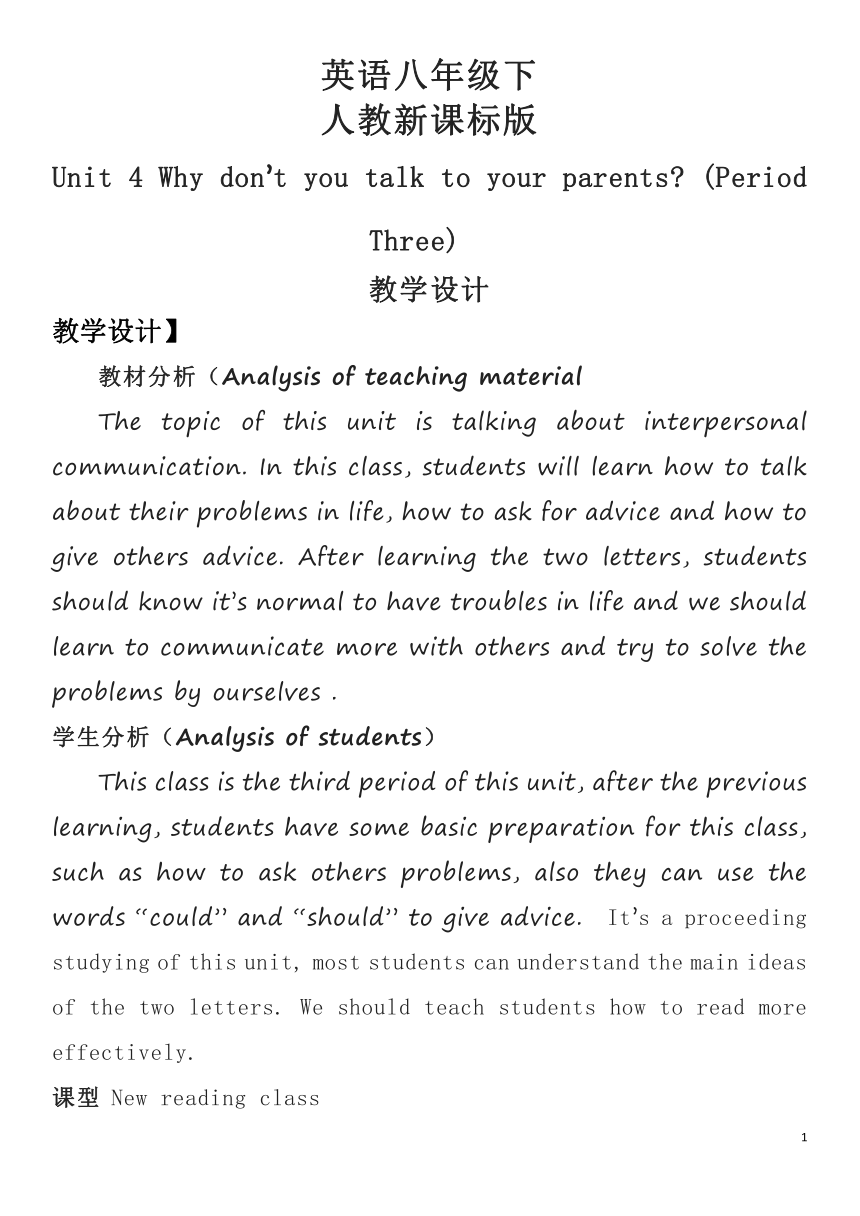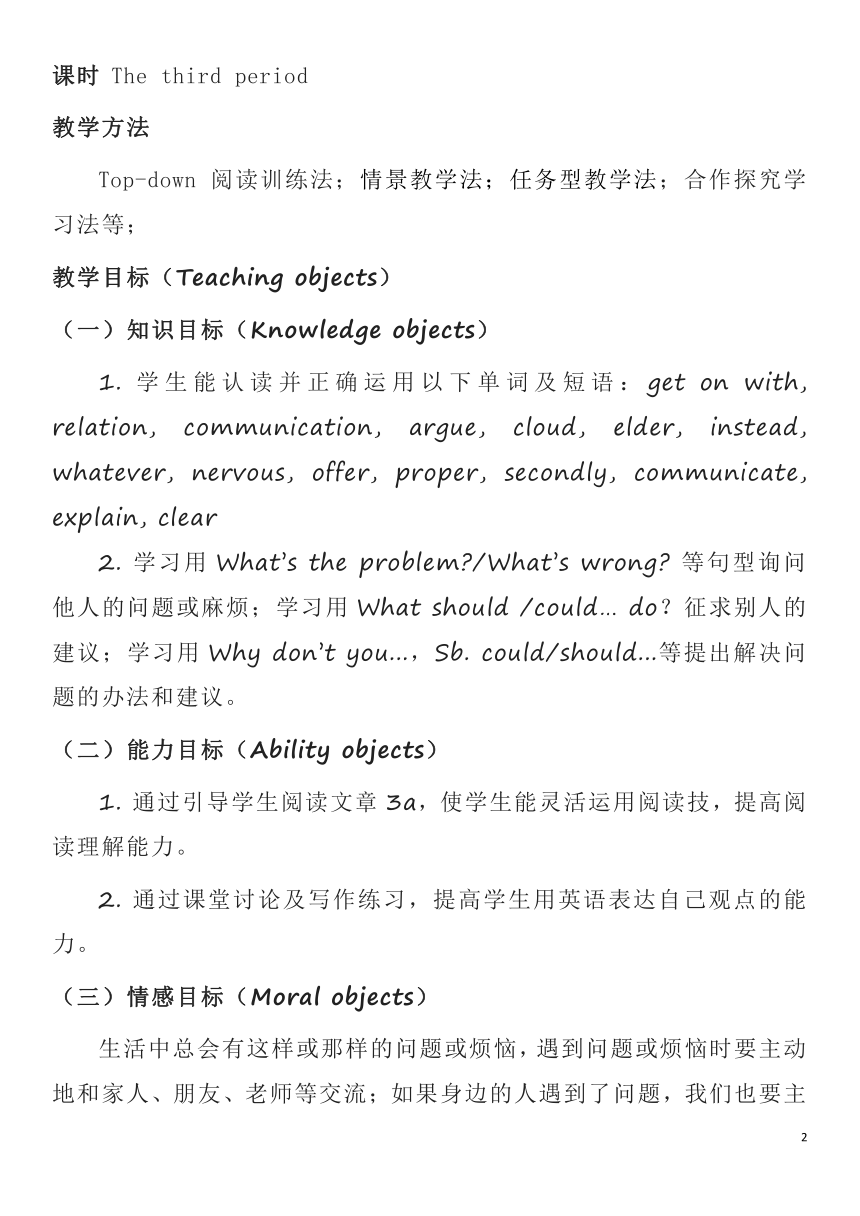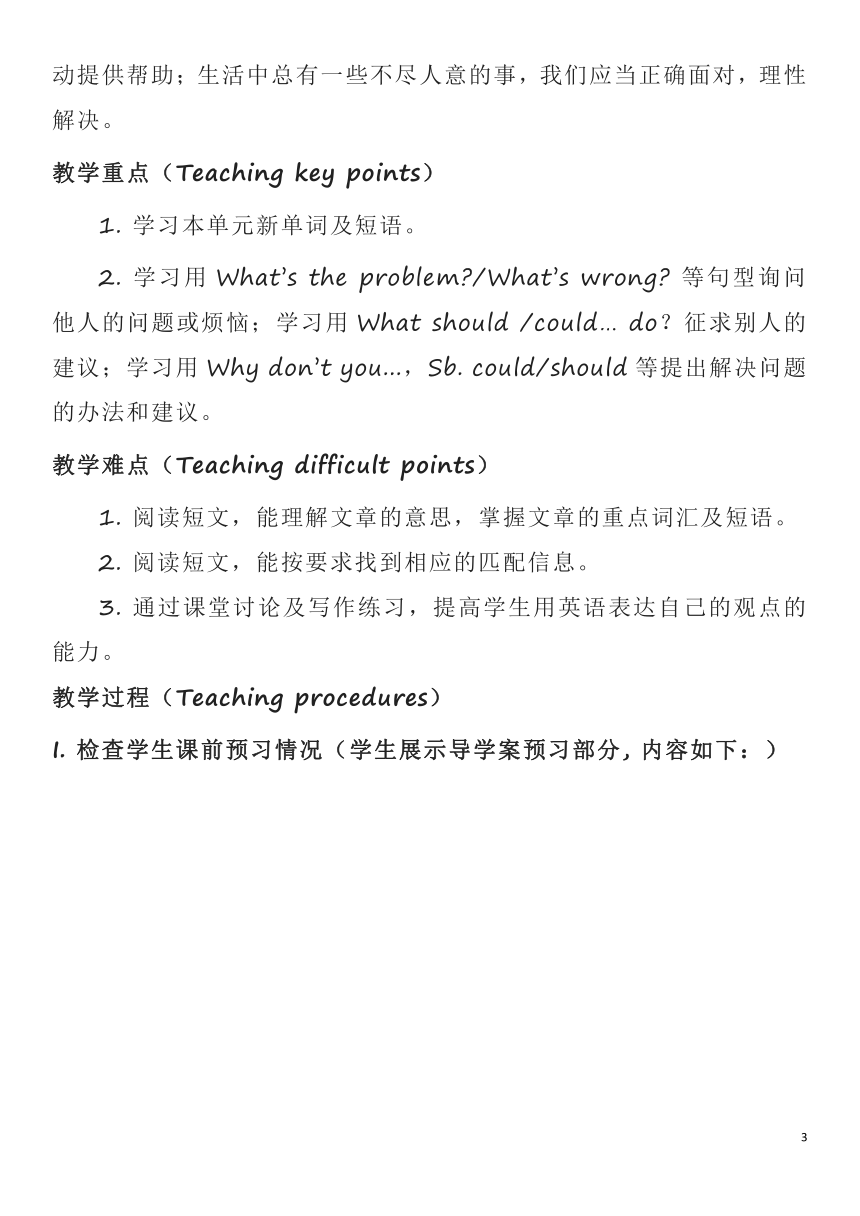英语八年级下人教新课标版Unit 4 Why don’t you talk to your parents教学设计
文档属性
| 名称 | 英语八年级下人教新课标版Unit 4 Why don’t you talk to your parents教学设计 |  | |
| 格式 | docx | ||
| 文件大小 | 22.8KB | ||
| 资源类型 | 教案 | ||
| 版本资源 | 人教新目标(Go for it)版 | ||
| 科目 | 英语 | ||
| 更新时间 | 2023-10-27 17:32:45 | ||
图片预览



文档简介
英语八年级下
人教新课标版
Unit 4 Why don’t you talk to your parents (Period Three)
教学设计
教学设计】
教材分析(Analysis of teaching material
The topic of this unit is talking about interpersonal communication. In this class, students will learn how to talk about their problems in life, how to ask for advice and how to give others advice. After learning the two letters, students should know it’s normal to have troubles in life and we should learn to communicate more with others and try to solve the problems by ourselves .
学生分析(Analysis of students)
This class is the third period of this unit, after the previous learning, students have some basic preparation for this class, such as how to ask others problems, also they can use the words “could” and “should” to give advice. It’s a proceeding studying of this unit, most students can understand the main ideas of the two letters. We should teach students how to read more effectively.
课型 New reading class
课时 The third period
教学方法
Top-down 阅读训练法;情景教学法;任务型教学法;合作探究学习法等;
教学目标(Teaching objects)
(一)知识目标(Knowledge objects)
1. 学生能认读并正确运用以下单词及短语:get on with, relation, communication, argue, cloud, elder, instead, whatever, nervous, offer, proper, secondly, communicate, explain, clear
2. 学习用What’s the problem /What’s wrong 等句型询问他人的问题或麻烦;学习用What should /could… do?征求别人的建议;学习用Why don’t you...,Sb. could/should...等提出解决问题的办法和建议。
(二)能力目标(Ability objects)
1. 通过引导学生阅读文章3a,使学生能灵活运用阅读技,提高阅读理解能力。
2. 通过课堂讨论及写作练习,提高学生用英语表达自己观点的能力。
(三)情感目标(Moral objects)
生活中总会有这样或那样的问题或烦恼,遇到问题或烦恼时要主动地和家人、朋友、老师等交流;如果身边的人遇到了问题,我们也要主动提供帮助;生活中总有一些不尽人意的事,我们应当正确面对,理性解决。
教学重点(Teaching key points)
1. 学习本单元新单词及短语。
2. 学习用What’s the problem /What’s wrong 等句型询问他人的问题或烦恼;学习用What should /could… do?征求别人的建议;学习用Why don’t you...,Sb. could/should等提出解决问题的办法和建议。
教学难点(Teaching difficult points)
1. 阅读短文,能理解文章的意思,掌握文章的重点词汇及短语。
2. 阅读短文,能按要求找到相应的匹配信息。
3. 通过课堂讨论及写作练习,提高学生用英语表达自己的观点的能力。
教学过程(Teaching procedures)
I. 检查学生课前预习情况(学生展示导学案预习部分, 内容如下:)
课前预习: 预习Unit 4,P 27相关词汇,写出下列单词或短语: 1. 和睦相处 2. 关系;联系 3. 争吵;争论(v.) (n.) 4. 交流;沟通(n.) (v.) 5. 年纪较长的 --- 年老的,较旧的 6. 主动提出 7. 解释;说明 8. 任何;每一 9. 焦虑的;担忧的 10. 正确的;恰当的 11. 清楚的;明朗的
II. 通过课件展示,引入新课学习
Step 1. Warming up
Lead in the new class by three questions: 1.Do you love your family 2. Do you have brothers or sisters 3. Do your parents fight a lot
Step 2. New class proceeding
Before reading
Look at the boy and guess:1. Is the boy happy 2. How old is he Then guess: What’s the meaning of “counselor”, making preparation for the following reading.
While reading
Firstly, read the two letters quickly and choose the right answers, skimming for the key words or phrases.
Secondly, read again and answer the four questions, scanning for the main information.
Thirdly, listen and repeat, listening training, reading for more information and better understanding of the letters.
After reading
Check the reading effect by fill in the blanks.
Step 3. Exercises in 3c
Find the words or phrase in the letters, checking the understanding of key vocabulary.
Make your own sentences, checking the using of key vocabulary.
Step 4. Writing practice
Discuss: Do you agree or disagree with Mr. Hunt’s advice Why Try to show your own ideas. Try to solve the problems in our life.
Step 5. Self check
Check the key vocabulary spelling by writing them correctly. Students can check the mistakes by themselves.
Step 6. Homework
According to your learning situation and choose two pieces to finish
1. Recite the key words and phrases in this class.
2. Read the two letters at least three times.
3. Do you have any troubles in your life Please write a letter to your friend and ask for
advice.
III.板书设计 :
Unit 4 Why don’t you talk to your parents ( Period three )
I. Words and phrases
get on with relation communication(n.)---communicate(v.)
argue(v.)---argument(n.) elder---older whatever
nervous offer to do sth. proper explain
II. Key sentences
Why don’t you... / Why not...
... could ...
... should ...
IV. 课后反思
人教新课标版
Unit 4 Why don’t you talk to your parents (Period Three)
教学设计
教学设计】
教材分析(Analysis of teaching material
The topic of this unit is talking about interpersonal communication. In this class, students will learn how to talk about their problems in life, how to ask for advice and how to give others advice. After learning the two letters, students should know it’s normal to have troubles in life and we should learn to communicate more with others and try to solve the problems by ourselves .
学生分析(Analysis of students)
This class is the third period of this unit, after the previous learning, students have some basic preparation for this class, such as how to ask others problems, also they can use the words “could” and “should” to give advice. It’s a proceeding studying of this unit, most students can understand the main ideas of the two letters. We should teach students how to read more effectively.
课型 New reading class
课时 The third period
教学方法
Top-down 阅读训练法;情景教学法;任务型教学法;合作探究学习法等;
教学目标(Teaching objects)
(一)知识目标(Knowledge objects)
1. 学生能认读并正确运用以下单词及短语:get on with, relation, communication, argue, cloud, elder, instead, whatever, nervous, offer, proper, secondly, communicate, explain, clear
2. 学习用What’s the problem /What’s wrong 等句型询问他人的问题或麻烦;学习用What should /could… do?征求别人的建议;学习用Why don’t you...,Sb. could/should...等提出解决问题的办法和建议。
(二)能力目标(Ability objects)
1. 通过引导学生阅读文章3a,使学生能灵活运用阅读技,提高阅读理解能力。
2. 通过课堂讨论及写作练习,提高学生用英语表达自己观点的能力。
(三)情感目标(Moral objects)
生活中总会有这样或那样的问题或烦恼,遇到问题或烦恼时要主动地和家人、朋友、老师等交流;如果身边的人遇到了问题,我们也要主动提供帮助;生活中总有一些不尽人意的事,我们应当正确面对,理性解决。
教学重点(Teaching key points)
1. 学习本单元新单词及短语。
2. 学习用What’s the problem /What’s wrong 等句型询问他人的问题或烦恼;学习用What should /could… do?征求别人的建议;学习用Why don’t you...,Sb. could/should等提出解决问题的办法和建议。
教学难点(Teaching difficult points)
1. 阅读短文,能理解文章的意思,掌握文章的重点词汇及短语。
2. 阅读短文,能按要求找到相应的匹配信息。
3. 通过课堂讨论及写作练习,提高学生用英语表达自己的观点的能力。
教学过程(Teaching procedures)
I. 检查学生课前预习情况(学生展示导学案预习部分, 内容如下:)
课前预习: 预习Unit 4,P 27相关词汇,写出下列单词或短语: 1. 和睦相处 2. 关系;联系 3. 争吵;争论(v.) (n.) 4. 交流;沟通(n.) (v.) 5. 年纪较长的 --- 年老的,较旧的 6. 主动提出 7. 解释;说明 8. 任何;每一 9. 焦虑的;担忧的 10. 正确的;恰当的 11. 清楚的;明朗的
II. 通过课件展示,引入新课学习
Step 1. Warming up
Lead in the new class by three questions: 1.Do you love your family 2. Do you have brothers or sisters 3. Do your parents fight a lot
Step 2. New class proceeding
Before reading
Look at the boy and guess:1. Is the boy happy 2. How old is he Then guess: What’s the meaning of “counselor”, making preparation for the following reading.
While reading
Firstly, read the two letters quickly and choose the right answers, skimming for the key words or phrases.
Secondly, read again and answer the four questions, scanning for the main information.
Thirdly, listen and repeat, listening training, reading for more information and better understanding of the letters.
After reading
Check the reading effect by fill in the blanks.
Step 3. Exercises in 3c
Find the words or phrase in the letters, checking the understanding of key vocabulary.
Make your own sentences, checking the using of key vocabulary.
Step 4. Writing practice
Discuss: Do you agree or disagree with Mr. Hunt’s advice Why Try to show your own ideas. Try to solve the problems in our life.
Step 5. Self check
Check the key vocabulary spelling by writing them correctly. Students can check the mistakes by themselves.
Step 6. Homework
According to your learning situation and choose two pieces to finish
1. Recite the key words and phrases in this class.
2. Read the two letters at least three times.
3. Do you have any troubles in your life Please write a letter to your friend and ask for
advice.
III.板书设计 :
Unit 4 Why don’t you talk to your parents ( Period three )
I. Words and phrases
get on with relation communication(n.)---communicate(v.)
argue(v.)---argument(n.) elder---older whatever
nervous offer to do sth. proper explain
II. Key sentences
Why don’t you... / Why not...
... could ...
... should ...
IV. 课后反思
同课章节目录
- Unit 1 What's the matter?
- Section A
- Section B
- Unit 2 I'll help to clean up the city parks.
- Section A
- Section B
- Unit 3 Could you please clean your room?
- Section A
- Section B
- Unit 4 Why don't you talk to your parents?
- Section A
- Section B
- Unit 5 What were you doing when the rainstorm came
- Section A
- Section B
- Review of Units 1-5
- Unit 6 An old man tried to move the mountains.
- Section A
- Section B
- Unit 7 What's the highest mountain in the world?
- Section A
- Section B
- Unit 8 Have you read Treasure Island yet?
- Section A
- Section B
- Unit 9 Have you ever been to a museum?
- Section A
- Section B
- Unit 10 I've had this bike for three years.
- Section A
- Section B
